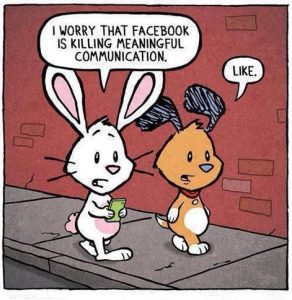“Men hate each other because they fear each other; they fear each other because they don’t know each other; they don’t know each other because they are often separated from each other”¹
~Martin Luther King, Jr.
Be still and know that I am God.
~Psalm 46:10 (NRSV)
A seismic shift is occurring in society that is negatively impacting the American church. This is not a lament for how things used to be but an observation about dwindling demographics. The statistics done by research groups such as The Pew Research Center² continually show that young adults are not coming to church, and church people are not coming to church as regularly. There is a large cultural shift currently happening, and there are multiple impacts on the church. But a large contributing factor to the church’s decline is our constant connectivity through new technologies.
In the above quote, Dr. Martin Luther King answers a question once submitted to him: “I am a Negro, but I don’t like Jews. What can I do to overcome this feeling?” Dr. King’s advice for this person is to seek “real personal fellowship” with someone who is Jewish. He believes that prejudice resides in ignorance, and therefore, “they fear each other because they don’t know each other.” The problem we are currently facing with new connective technologies is that they do not give us true connections but the facade of them. The danger in this is that we become satisfied with our partial connections with one another and mistake those for authentic community.
While conducting research, sociologist Sherry Turkle visited several websites where people seek to find online connection, including popular social media sites as well as some that were more obscure. In her book Alone Together,³ Turkle shows how people are tenuously tethered to one another but not completely connected. An online presence is a curated existence, showing people only what you want them to see. Our curated existence online has left us lonelier than ever, because it is not an actual connection to someone. We no longer know people; rather we know about people.

Brian Gordon. February 13th, 2013. http://officialshoebox.tumblr.com/post/120444520866
The partial connections we have through constant virtual connectivity are going to give us a false sense of community. There is no need to be vulnerable in a curated existence. And while many people “over share” their lives online, people are becoming less adept at relationships with actual people in their real lives. We are often distracted by our virtual relationships, ones that give us quasi-connections with people who are not physically in the room.
The comedian Louis CK speaks about this new technologically-tethered existence often. He acts intentionally in order to be in relationship with his daughter (Note: video link below; begin watching at 2:20 due to inappropriate content prior to that point):
Team Coco. “Louis C.k. Quit the Internet.” Posted [May 5th, 2016]. Youtube Video, 5:56. https://youtu.be/2Df4xdr_5pk?t=140.
In the above clip, Louis CK talks about how distracted he is, and how much he misses because of his constantly connected life. In order to fix this problem, he resorted to giving up his tenuous connections with others in order to have meaningful connections with those closest to him.
An answer to the substitution of connection with a technological tether, I think, can be found in lived community. Community is woven into the church at its most basic and theological levels. God’s self is a community in the Trinity. Richard Rohr writes, “If we take the depiction of God in The Trinity seriously, we have to say, ‘In the beginning was the relationship.’”4
I think the church can offer the same thing by following the Biblical command of fasting. Fasting in the Bible is often mentioned alongside prayer. It is a way of connecting with our Creator. If our lives are constantly filled with false connections and distractions, then fasting from those distractions will help us connect more meaningfully with God and one another as we intentionally endeavor to not be constantly distracted and tethered.
It is my hope that by fasting from constant technological connection that authentic connections are made in the participants’ personal and faith community. I also hope that the experience would give each person a better understanding of a community formed through intimate relationships. Fasting reminds us that it is God who sustains us, not our shared existence on the Internet. To do this I wrote a six-week devotional guide for participants to fast from their technological tethers. Some knew that Facebook or Twitter were what took up most of their attention, so they took a break from those sites. Others knew checking sports scores or scrolling through Pinterest were pulling their minds elsewhere. Anything that drives the participant to share lived experiences with someone who is not physically present was removed from their life as the participants committed to being intentionally present and prayerful. Each week had a reflection on scripture chosen for its connection to fasting and prayer, as well as a prayer and journaling guide. The participants were also surveyed before and after the fast about their social media habits and the realizations they had when it was removed.
The three groups that participated in the fast were a small group of college students (http://www.reinhardt.edu), a small group of young adults in a Sunday school class (http://www.creekside.net/sunday-morning-adult-studies.html), and a staff in a church in North Carolina (http://www.pinehurstumc.org). In the fast I asked that the participants journal and share their experiences with me. At the end of the fast, the participants were made more aware of how vast their constant virtual connection was and how much of their time it consumed. After fasting, the participants were much more intentional about constant virtual connections in their life, and what place of importance it should have.
One college student wrote, “I have noticed through this fast is that I think more completely than in short, witty blurbs that I’d post. I yearn for conversations about life, and want to listen to others.” By living a constantly connected and curated life, this student found they were always trying to figure out what they were going to say next, and what kind of influence it would have. By seeking to live in community, she began to listen to others. She found that an authentic connection is realized in vulnerability and trust, not in what is carefully shared or not shared.
Other participants in the study expressed similar reactions. In the young adult Sunday school class many talked about how they did not realize how much of their time was taken up by social media. One of the participants said that they found their relationship with their husband and daughter strengthened significantly when she did not let social media distract her. Below is a video of a married couple who both participated in the fast and the many different aspects of their lives it influenced (see below):
Thrasher, Jordan. “Reflection on a Social Media Fast.” Recorded [March, 2017]. YouTube video, 5:20. Posted [March, 2017]. https://youtu.be/r6RiSlDxD0Q.
These are important lessons for modern ministry. Many people in our world have become resigned to connections through the Internet rather than fully experience actual connections in Christian community. There are people who feel connected to a local church even though they do not participate in its ministries because they see updates and posts, and they are missing the authentic experience of connection with a body of faith. It is important that churches teach our congregations how to be in community with one another. By fasting from the constantly tethered culture in which we have placed ourselves, we realize our deeper need for connection with God and one another. My hope is that when people in churches experience Christian community through actual relationships, then the virtual life will be put in its proper place and people will rediscover how to share their lives with one another as disciples of Christ.
1. Martin Luther King, “Advice for Living,” Ebony, November, 1990, 136.
2. Michael Lipka, “5 key findings about the changing U.S. Religious Landscape,” Think Tank, May 12, 2015, accessed January 19th, 2017, http://www.pewresearch.org/fact-tank/2015/05/12/5-key-findings-u-s-religious-landscape/.
3. Sherry Turkle, Alone Together: Why We Expect More from Technology and Less from Each Other (New York: Basic Books, 2012). Kindle.
4. Richard Rohr, The Divine Dance: The Trinity and Your Transformation (New Kensington: Whitaker House, 2016), Location 423, Kindle.

Sam Candler loves the community and diversity of parish life. An amateur pianist, he had intended to become a jazz musician before he was called into the priesthood. Thus, he values the role of music in prayer, and he has served on Liturgy and Music Committees in several dioceses. He also loves the outdoors, where he also finds community and diversity. Having grown up in rural areas, he continues to fish, hunt, hike, and observe the stars as much as possible. In South Carolina, he was a member of the Governor’s Commission on Race Relations; and he believes that the Church must continue its social and civic call to justice for all. His vision for St. Philip’s Cathedral is that it continues to grow as a passionate and vibrant community of Christian faith, serving the city and diocese of Atlanta.